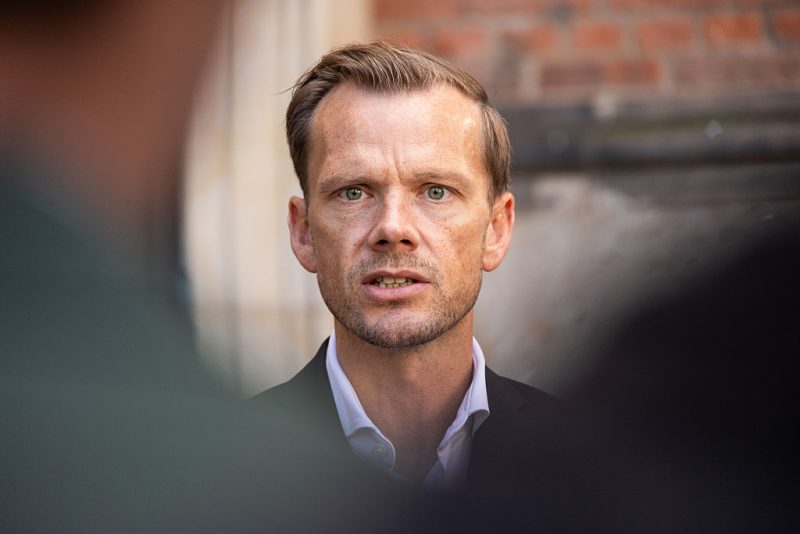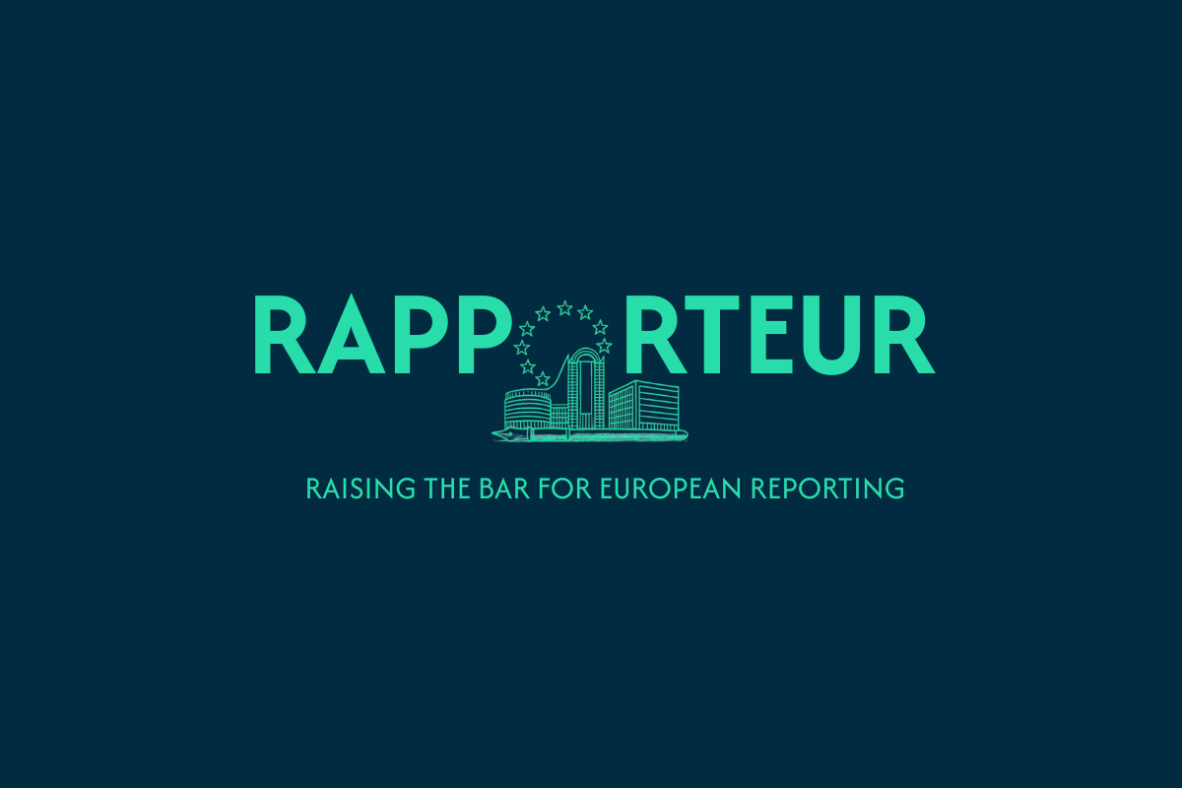EU's dysfunctional family finds common foe
In today’s edition: Parliament’s main political groups gang up on von der Leyen’s €2 trillion spending plan, Spain’s Sánchez fends off a Senate grilling, and Denmark scrambles to sway France, Italy, and Poland on the EU’s 2040 climate goal

EXCLUSIVE: EU Ombudsman Teresa Anjinho promoted her head of cabinet to the office’s most senior civil service role, according to an internal email seen by my colleagues Eddy Wax and Elisa Braun.
Welcome to Rapporteur. This is Nicoletta Ionta with Eddy Wax in Brussels.
Got a story we should know about? Drop us a line – we read every message.
Need-to-knows:
- MFF: Parliament’s main political groups unite against Ursula von der Leyen’s €2 trillion spending plan
- Spain: Pedro Sánchez denies wrongdoing at Senate inquiry, accusing opponents of ‘mudslinging’
- Climate: Denmark seeks to win over France, Poland, and Italy on the EU’s 2040 emissions target
Subscribe
Today’s edition is powered by the European Free Alliance
Direct regional funding is essential for the EU’s cohesion
The renationalisation of European funds proposed in the MFF 2028-2034 would increase the economic gap between peripheral regions and the already wealthier European capital cities. In EFA, we believe in the EU’s role in mitigating territorial inequalities. We call EU leaders to draft a new proposal that protects direct funding for EU’s regions.
This is a political ad. More info at https://www.euractiv.com/political-ads/.
For details relating to this campaign, more info at https://content.efaparty.eu/.
From the capital
They bicker, they backstab, they barely tolerate sitting in the same room. But now, Europe’s most dysfunctional family has found a common enemy: Ursula von der Leyen’s shiny €2 trillion budget plan.
The European People’s Party, S&D, Renew Europe, and the Greens – yes, those four who agree on almost nothing – signed a joint letter on Thursday threatening to block negotiations unless seven major changes are made. In a Parliament that cannot agree on migration, climate, or defence, there’s one thing that unites them: hating this MFF.
Their lead negotiator, Siegfried Mureșan, said the majority in Parliament would be so broad that the Commission could hardly continue to defend its proposal. A rarity indeed.
For von der Leyen, it’s a political migraine. A rebellion from her own centrist coalition – the very alliance that carried her through the European elections and secured her second mandate – signalling growing fatigue with the Commission’s top-down style.
At the heart of the clash is the proposal to merge regional and farm subsidies into €865 billion worth of “national and regional partnership plans.” Regional leaders, farmers, and ministers are losing their collective minds, with even Brussels insiders admitting this could get messy.
The four groups are pushing to keep the Common Agricultural Policy – designed to ensure fair competition among EU farmers – separate from Cohesion Funds, while calling for a stronger role for Parliament in approving and revising member states’ spending plans.
Parliament’s power flex comes with a deadline: 12 November, when MEPs gather for a plenary debate in Brussels.
A Commission spokesperson said it was “prepared to listen to Parliament and Council” and described the current situation as “a set of constructive exchanges.” Still, they declined to comment on the specifics of Parliament’s wish list.
Even the Parliament’s right-wing ECR group chimed in, but for very different reasons. While the centrist alliance argues the plan gives too much power to national capitals, conservatives complain it leaves too much in Brussels’ hands.
In a letter seen by Rapporteur and sent to the Commission president on Thursday, the ECR group also called for changes, opposing the idea of merging cohesion and agricultural funds into a single national plan. No one’s a fan.
“The EP is playing with fire,” one EU diplomat said, warning that Parliament’s rebellion against the Commission could easily burn the fragile balance of the MFF talks. At least for once, group leaders are all lighting the same match.
Who ombuds the ombudsman?
European Ombudsman Teresa Anjinho is facing criticism after promoting her head of cabinet to the post of secretary general, the office’s top civil service role.
According to an internal email seen by Euractiv, Anjinho – the former centre-right Portuguese politician eight months into her mandate – informed staff on Thursday that she had offered the job to Lampros Papadias, a Greek lawyer who currently serves as her head of cabinet.
“For the new ombudsman, I don’t think it’s a good look,” said a former staffer, calling the move a “very sad day for rule of law in the EU administration.”
Can the EU even pass a 2040 climate target?
The Danes, who currently hold the rotating presidency of the EU Council, have called in envoys this morning to broker a compromise ahead of Tuesday’s meeting of environment ministers. Their goal: to overcome a blocking minority led by France, Poland, and Italy.
Under the EU’s population-weighted voting system, the three countries can block any deal. And they are rather unhappy with the proposed 90% emissions reduction target, according to my colleague Nikolaus J. Kurmayer.
Environment ministers get to decide two figures: how much outsourcing of emissions will be permitted (where countries like Germany committed themselves to 3% in their coalition treaty), and when the mechanism should take effect.
To sweeten the deal, according to a draft seen by Euractiv, the Danes have offered a review of the target every two years, allowing for downward adjustments if implementation proves too onerous, while promising additional support for industry and farmers.
Off the agenda
One EU diplomat told Rapporteur that the planned trilogue on the bloc’s anti-corruption directive has been delayed – meaning the file won’t surface in November after all. Despite earlier hopes to revive talks, divisions over whether to criminalise “abuse of functions” remain too deep to bridge. The setback pushes the already troubled directive further into uncertainty, with officials warning it could sink entirely if no breakthrough is reached before year’s end.
On the agenda
By 15 October, the European Commission was meant to publish its first assessment identifying which EU countries are under migration pressure, and who owes what under the “solidarity pool,” part of the new Pact on Migration. The mechanism decides whether countries must relocate asylum seekers, contribute financially, or provide other types of support.
But the publication was postponed, as announced during this month’s Home Affairs Council, a delay that underscores the political sensitivity surrounding the report. Several sources now suggest the long-awaited document could finally see the light next week.
Metals relief for Europe
European and Chinese officials are holding “technical” talks in Brussels today, with Beijing’s export controls on strategically crucial rare earths at the top of the agenda.
China’s most punishing restrictions on the metals – which have hammered Europe’s industrial base – appear to have been suspended following Donald Trump’s “amazing” meeting with Xi Jinping on Thursday.
European officials, however, have struck a cautious tone. “We are still to understand exactly what the outcome of the discussion between the US authorities and the Chinese authorities will deliver in terms of rare earths,” European Central Bank President Christine Lagarde said yesterday.
It remains unclear what Friday’s meeting will yield. Indeed, it is not yet certain whether Brussels will even issue an official read-out, according to a Commission spokesperson.
Uncharted waters
Greek PM Kyriakos Mitsotakis recently announced plans to organise a multilateral meeting of Eastern Mediterranean countries to address ongoing maritime disputes, as my colleague Sarantis Michalopoulos reports.
Yet given the complexity and volatility of one of the world’s most sensitive regions, optimism remains limited. Mitsotakis hopes to bring together Cyprus, Egypt, Turkey, and Libya to explore solutions to long-standing disagreements over maritime zones crucial for gas and oil exploration.
The US has long sought regional stability, while for Europe the stakes are even higher – potential energy resources could advance the EU’s goal of greater strategic autonomy.
The capitals
PARIS 🇫🇷
By the slimmest of margins – 185 votes to 184 – France’s National Assembly has backed a far-right Rassemblement National resolution urging the repeal of the 1968 Franco-Algerian migration accords. The non-binding vote, the first RN initiative ever to pass, was celebrated by Marine Le Pen as “historic.” Left-wing and centrist MPs cried foul, faulting Emmanuel Macron’s absent majority and accusing the centre-right of siding with the far right to dismantle special residency rights for Algerians.
ROME 🇮🇹
Italy’s Senate on Thursday passed a constitutional reform dividing the careers of judges and prosecutors – a change long sought by the late Silvio Berlusconi and central to Giorgia Meloni’s agenda. Approved in its fourth and final reading, the measure lacks the supermajority needed to take effect automatically and will instead go to a referendum next spring. Meloni celebrated the vote as “a historic milestone,” while opponents warned that it marks a “power grab” that could erode the independence of the judiciary.
MADRID 🇪🇸
Under fire in a Senate inquiry, Pedro Sánchez said on Thursday that he received small cash payments from his Socialist Party – “anecdotal expenses,” he said, never exceeding €1,000. Sánchez dismissed allegations of corruption and defended his wife and brother, both under investigation, arguing that the PSOE’s finances were transparent. The opposition Popular Party, which controls the Senate, summoned Sánchez over allegations of kickbacks involving rigged public tenders that have implicated former ministers and senior party officials. He accused the PP of turning the Senate into a “mudslinging machine.”
LISBON 🇵🇹
Portugal, Spain, and the European Commission have agreed on steps to complete the Lisbon-Madrid rail link by 2030, cutting travel time between the two capitals to around five hours, according to the Infrastructure Ministry. A high-speed connection reducing the journey to three hours is planned for 2034. EU Transport Commissioner Apostolos Tzitzikostas hailed the project as “an outstanding example” of Europe’s rail ambitions, noting that Brussels has already granted €235 million.
THE HAGUE 🇳🇱
The Farmer-Citizen Movement faces steep losses, projected to fall from seven to four seats after its brief spell in a coalition government. Founded during farmer protests in 2019, the party rose on promises to shield agriculture from EU rules, but many of its domestic plans stalled before the coalition collapsed. A centrist government could revive mandatory livestock cuts, threatening one of the populist party’s key pledges.
PRAGUE 🇨🇿
Tomio Okamura, a far-right Czech politician backed by Andrej Babiš’ ANO party, is set to become Speaker of the Chamber of Deputies after allies back his nomination. His bloc, formed following the 3–4 October elections, holds a narrow majority. Previously stripped of parliamentary immunity over racist campaign materials, Okamura regained it after his re-election. Critics warn that his appointment could damage the country’s international image, but his victory appears all but assured.
RIGA 🇱🇻
Latvia has voted to quit Europe’s convention on violence against women, with one of PM Evika Siliņa’s coalition partners siding with the opposition to push the withdrawal through parliament. The move defied both Siliņa and the president – and rekindled debate over whether the Istanbul Convention’s gender definitions go too far.
WARSAW 🇵🇱
PM Donald Tusk and his Lithuanian counterpart Inga Ruginienė have agreed that Poland will reopen its border crossings with Belarus “around mid-November,” Polish government spokesman Adam Szłapka said on Thursday. Szłapka noted that the reopening had been planned earlier, but Lithuania raised concerns during talks with Tusk over rising tensions along its own border.
VILNIUS 🇱🇹
Lithuania closed Vilnius airport briefly on Thursday due to balloons flying nearby, in what it said was the sixth such airspace violation this month. Officials suspect smugglers and accuse Belarus of failing to act, as tensions rise between the neighbours. Belarusian President Alexander Lukashenko called Lithuania’s response a “crazy scam” and accused the West of waging a hybrid war.
STOCKHOLM 🇸🇪
Emma Wiesner, a Swedish liberal MEP with the Centre Party, announced she will abandon X, blaming the social media platform’s toxic tone of public debate. “You hesitate to write what you want, people call you ugly and fat,” she said, describing a political climate that had made her “more cynical and bitter.” Her decision comes after Centre Party leader Anna-Karin Hatt resigned two weeks ago over harassment and threats.
BRATISLAVA 🇸🇰
A social media storm erupted in Slovakia this week over claims that the government had imposed a speed limit for pedestrians. In reality, the new rule – part of a traffic law amendment taking effect in 2026 – caps cyclists and e-scooter users on pavements at 6km/h to improve pedestrian safety. Police and the cyclist group Cyklokoalícia stressed it “doesn’t ban sprinting for the bus.”
Also on Euractiv
Danish Presidency backs away from ‘chat control’
The Danish Council presidency is backing away from pushing for mandatory detection orders in a…
2 minutes

Denmark has softened its stance on the EU’s divisive child sexual abuse proposal, dropping support for a provision that would allow mandatory detection orders on online platforms in favour of voluntary scanning, Justice Minister Peter Hummelgaard said.
The compromise aims to revive stalled Council talks on the regulation, long criticised by privacy advocates as a form of “chat control.”
Borders, bottlenecks, and bureaucracy: the barriers to moving troops from Lisbon to Lviv
Russia’s war on Ukraine has woken up Europe to address the shortfalls in its defence.…
6 minutes

A tank can travel from Lisbon to Kyiv in under two days – on paper. In reality, Europe’s defences are stalled at its own frontiers, where diplomatic clearances, customs stamps, and 45-day waits make the continent’s armies hostage to its bureaucracy. Brussels’ coming fix is a test of whether Europe can move as fast as the threats around it.
Agenda
📍 Šefčovič meets Italian Foreign Minister Antonio Tajani in Rome
📍 Dombrovskis takes part in the second dialogue on implementing the Recovery Plan
Contributors: Elisa Braun, Thomas Møller Nielsen, Jacob Wulff Wold, Nikolaus J. Kurmayer, Maria Simon Arboleas, Sarantis Michalopoulos, Alessia Peretti, Charles Szumski, Aleksandra Krzysztoszek, Natália Silenská, Inés Fernández-Pontes, Aneta Zachová
Editors: Christina Zhao, Sofia Mandilara



